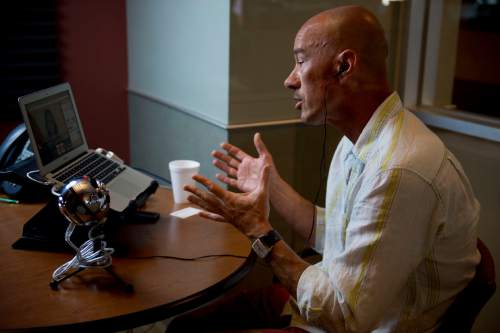This is an archived article that was published on sltrib.com in 2015, and information in the article may be outdated. It is provided only for personal research purposes and may not be reprinted.
Chris Burbank would do it all over again.
"I'm feeling very good. I've stood up for what I believe in," the ousted Salt Lake City police chief said Monday. "The events of last week, I've moved beyond."
Four days after being forced to resign by Mayor Ralph Becker, a relaxed Burbank appeared on Trib Talk, The Salt Lake Tribune's live-streamed video chat.
His departure surrounding a sexual- harassment case, the popular ex-chief said, was politically motivated by a mayor in an election year.
"I'm proud of the support I have received, and the department has developed in the community," he said of his nine years at the police helm.
For his part, Becker reiterated over the weekend that his decision was not politically motivated.
"Those who believe this was done because we are in an election year," the mayor said in a statement, "do not know me."
The issue at the center of last Thursday's showdown is the substantiated allegations of sexual harassment that led to the retirement a year ago of former Deputy Chief Rick Findlay.
The findings by the city's Department of Human Resources and Police Civilian Review Board were forwarded to Burbank by January 2014. Findlay had been placed on administrative leave, and no further action was taken until June 4, 2014, when Findlay retired with full benefits.
The dispute stirred up a storm at the time but died down until last month, when three female police officers filed a notice of claim with Salt Lake City, signaling their intent to sue the police department and the municipality.
A day later, the mayor released a statement saying sexual harassment was "unacceptable."
That was met with criticism of Becker from political challengers and others who complained that Findlay had walked away unpunished with benefits. News stories swirled for several weeks — sexual harassment at the police department and Becker's handling of it had become campaign fodder.
Becker called a 3 p.m. meeting Thursday with Burbank and handed him a letter he wanted the chief to read at a news conference taking full responsibility for the Findlay fiasco. When Burbank refused, he was asked to resign.
"I asked for time, if I could have the day and consult with my family," Burbank said Monday. The chief said Becker refused.
"It took me one paragraph before I knew I wasn't going to read that," Burbank said. "It would be disingenuous, and I wasn't going to do that to the public."
Not even an hour later, on the west steps of City Hall, Becker told reporters that Burbank had not handled the Findlay case well and had resigned. Burbank's "decision [not to demote Findlay] was contrary to specific direction from my office," the mayor said in a prepared statement.
Becker also released a June 12, 2014, letter from David Everitt, his chief of staff, that castigated Burbank for not demoting Findlay.
The two-term mayor said that he and his staff "had urged our police chief to, at a minimum, demote the offending officer and take corrective measures to avoid future incidents of sexual harassment."
Since then, Becker said, "the chief has fallen below my expectations."
After the June 12, 2014, letter, Burbank said Monday he had not had a single conversation with the mayor regarding Findlay until about 10 days ago.
"If the mayor was unhappy with that, he should have told me he was unhappy," Burbank said. "I don't feel I was treated with any respect on this."
Findlay is said to have stolen photos from the phone of one of the three female officers. The pictures were of two of the women in bikinis. He also is accused of possessing a nude photo that he identified as the third woman. The former deputy chief then shared the pictures with others in the department.
"We found his actions inappropriate," Burbank said, and the then-chief determined he did not want Findlay to remain in the police department.
Burbank put Findlay on administrative leave in November 2013. If the then-chief had simply demoted him, Burbank said, Findlay would be back in the workplace and that would be a "distraction."
In addition, a demoted Findlay still would have been allowed to stay on the force until he could retire with full benefits, Burbank explained.
"This was a responsible way to proceed," Burbank said of his decision. "It's about what is right for the organization, as a whole."
Burbank said he wants to "continue to influence policing," but not necessarily as a cop.
The 25-year police veteran said he wants to work on issues such as homelessness, guns and the over-incarceration of people of color.
In an official statement, the Salt Lake City Council has praised Burbank.
"For many years, our police department and its leadership team have had a solid reputation for serving the community at all levels with dignity, tolerance and respect."
Nonetheless, the council said, the police chief serves at the pleasure of the mayor.
Mike Brown, one of Burbank's deputy chiefs, has been named interim chief. Brown released a statement Monday saying that his goals are to "enforce a rigorous standard of community-based policing and to belay concern, uncertainty and doubt about the amazing impact we have as a department."
Becker said no search for a permanent replacement will take place until after the Nov. 3 election. That appointment must be approved by the City Council.



